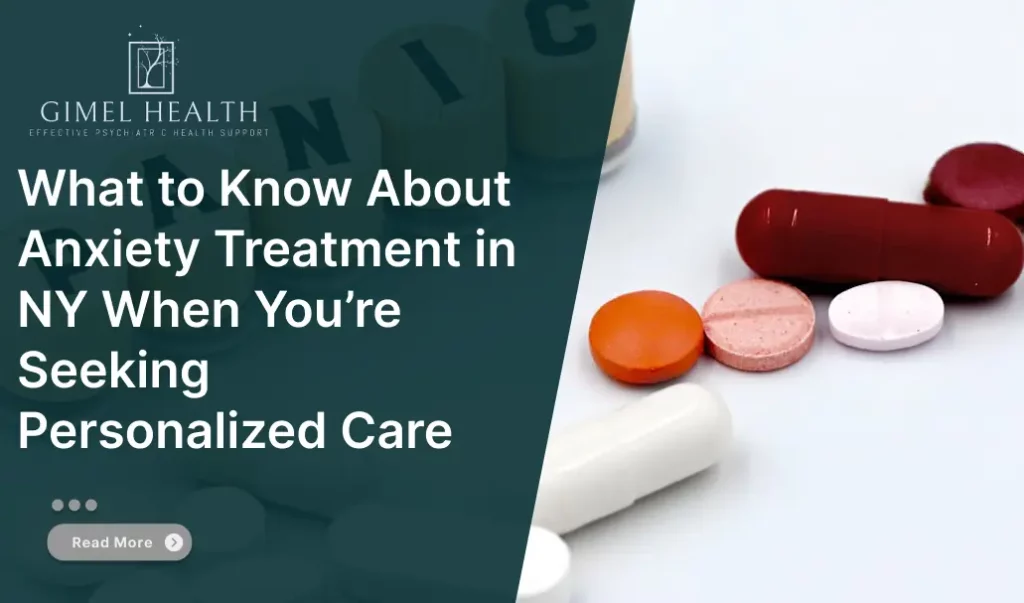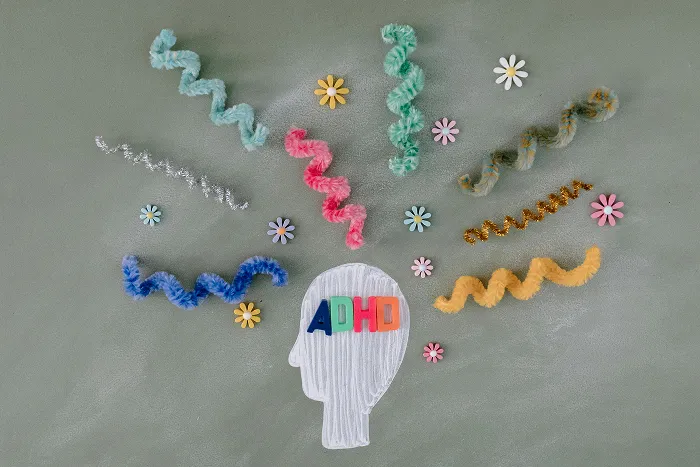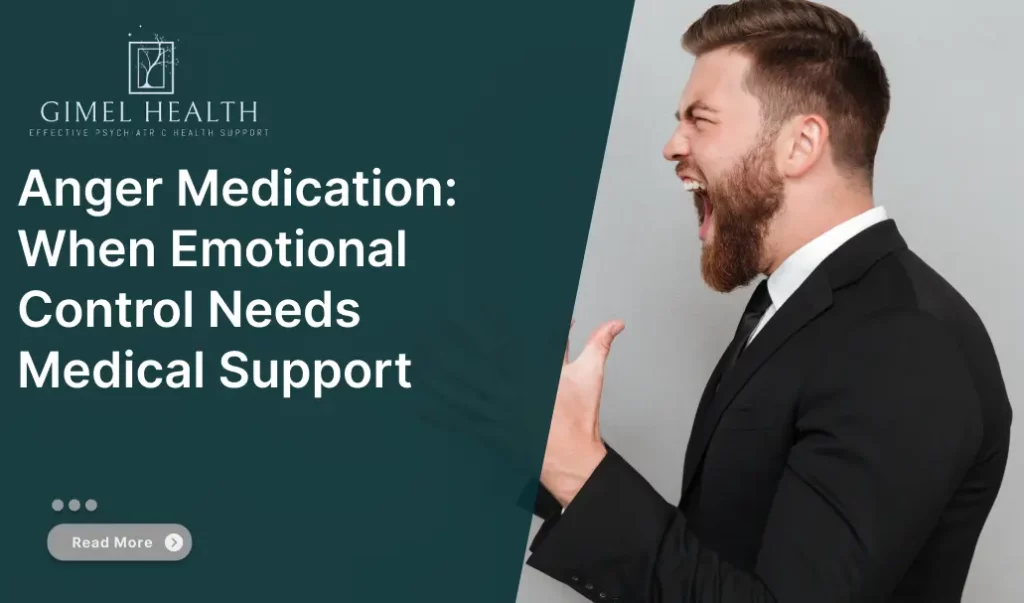
What to Know About Anxiety Treatment in NY When You’re Seeking Personalized Care
Anxiety is one of the most common mental health challenges facing adults and professionals today. If you are seeking anxiety

Struggling with Attention Deficity Hyperactivity Disorder (ADHD) and Bipolar Disorder can create complex challenges, such as overlapping symptoms, emotional dysregulation, and mood episodes, that make accurate diagnosis and effective treatment essential.
At our center, we offer comprehensive psychiatric disorder care, including precise diagnostic criteria evaluation and tailored treatment plans that address adult ADHD, bipolar symptoms, and co-occurring mood disorders.
Diagnostic overlap between ADHD and bipolar disorder, such as impulsive behavior, sleep deprivation, or emotional dysregulation, can lead to misdiagnosis. A proper evaluation, guided by DSM-5 statistical manual standards, helps distinguish manic episodes, depressive episodes, hypomanic episodes, and ADHD symptoms in the adult population.
Because stimulant medications for ADHD can worsen mood disorders in bipolar patients, especially those experiencing manic symptoms, we proceed with caution. A clear diagnosis of BD and ADHD comorbidity allows for a safer, dual-focused treatment strategy that reduces the risk of mood destabilization or psychotic symptoms.

Effective bipolar disorder treatment with comorbid ADHD involves:
1. Mood Stabilizers – Lithium, valproate, or anticonvulsants help prevent manic episodes and depressive episodes, while reducing suicide attempts and emotional volatility. In some cases, antipsychotic medications may be added to address severe symptoms or psychotic features.
2. ADHD Medications – Stimulant medication or non-stimulant options are used cautiously to avoid triggering mood symptoms. ADHD medications are typically introduced after mood stabilization to reduce risk of mixed episodes or mood dysregulation.
3. Psychotherapy – We use cognitive behavioral therapy, motivational interviewing, dialectical behavior therapy, and solution-focused therapy to help individuals manage emotional dysregulation, impulsive symptoms, executive function challenges, and mood fluctuations.
4. Integrated Care – Our treatment plans include coordination with healthcare providers, psychiatrists, and therapists to monitor for comorbid BD symptoms, substance abuse, sleep problems, and suicidal ideation, especially in young adults and early adulthood cases.
Many adults diagnosed with both ADHD and bipolar disorder also deal with anxiety disorders, sleep deprivation, substance use disorders, or even personality disorders like borderline personality disorder. For some individuals, additional challenges like conduct disorder, irritability, or high energy contribute to emotional and behavioral instability.
Treatment includes:
Medication for depressive states, irritability, or insomnia
Behavioral interventions for mood dysregulation and emotional reactivity
Therapy to support coping with major depressive disorder and loss of interest in daily activities
Monitoring for early-onset bipolar disorder, especially in those with a family history or genetic factors
We also screen for lesser-known but related conditions like cyclothymic disorder, which involves frequent mood swings not severe enough to meet full bipolar criteria but still disruptive.
Research, including longitudinal studies and systematic review data, confirms that combining bipolar medication with therapy is the most effective treatment for comorbid ADHD and bipolar disorder. We emphasize:
Mood charting and early intervention
Lifestyle changes to improve sleep, reduce stimulant overuse, and prevent relapse
Structured routines that support emotional regulation
Education on managing affective disorders, especially during major life transitions
Our approach ensures that ADHD patients and bipolar patients alike receive the long-term mental health care and support needed for sustained recovery.
At Gimel Health, we specialize in treating complex conditions like ADHD and Bipolar Disorder with personalized, evidence-based care. Whether you’re managing resistant depression, seeking adult ADHD treatment, or need comprehensive bipolar support services, we tailor every plan to fit your goals and lifestyle. We also offer medication for anxiety and depression when appropriate, ensuring your treatment addresses every aspect of your mental health.
Take the first step—schedule your consultation today and start your journey toward clarity, balance, and lasting relief.

Anxiety is one of the most common mental health challenges facing adults and professionals today. If you are seeking anxiety

Finding the right psychiatrist NJ is one of the most important decisions you can make for your long-term mental health.

Anger is a normal emotion, but when it becomes intense, unpredictable, or destructive, it may signal deeper mental health issues.
Your journey to better mental health starts here. With advanced expertise in biology and psychiatry, I build exclusive medication plans backed by science. Contact me to schedule your initial consultation.
(201) 815-4351
440 West Str, Ste 307, Fort Lee Bergen County NJ 07024
Systematic reviews and meta-analyses have shown that ADHD comorbidity is common in bipolar disorder, with higher rates of impulsive symptoms, emotional dysregulation, and conduct disorder in affected individuals. Studies also note an increased likelihood of sleep problems, substance abuse, and personality disorders in ADHD patients who develop bipolar symptoms later in life.
Accurate diagnosis relies on identifying age of onset, distinguishing similar symptoms, and understanding the nature of mood episodes. For example, bipolar disorder often involves cyclical mood shifts, while ADHD symptoms are more chronic and appear earlier in life. Differential diagnosis is critical to avoid mislabeling high energy or irritable mood as either a manic episode or hyperactivity. Clinicians also examine family history, comorbid symptoms, and DSM-5 diagnostic criteria.
You may have a related condition like cyclothymic disorder, characterized by less intense but chronic mood shifts. These are still disruptive and require attention. Emotional dysregulation is also common in borderline personality disorder and can be triggered by stress, sleep deprivation, or stimulant overuse. A mental health professional can evaluate if your symptoms reflect a milder mood disorder or early signs of bipolar II.
Yes. In most cases, mood stabilizers are introduced before ADHD medications to reduce the risk of manic episodes or mixed episodes. In individuals with high comorbidity rates, stimulant medication can increase the likelihood of psychotic symptoms if used without mood regulation. Once stabilized, ADHD symptoms can be addressed safely with adjusted dosing.
Many individuals with bipolar disorder and ADHD also experience major depressive disorder, generalized anxiety disorder, and occasionally oppositional defiant disorder. These comorbidities are often underdiagnosed but significantly impact treatment outcomes. Mood states, sleep patterns, and behavioral tendencies must be monitored consistently to develop an effective treatment plan.
Absolutely. Both disorders are linked to executive function deficits such as poor planning, impulsivity, difficulty organizing tasks, and emotional overreaction. Treatment often includes executive coaching, cognitive remediation, and therapies that enhance self-monitoring. Psychotherapy also helps reduce feelings of worthlessness, which can develop during depressive episodes or after repeated failures in work or relationships.
Yes. Bipolar II involves hypomanic episodes rather than full-blown mania, making it more likely to be confused with ADHD, especially when emotional highs and impulsivity overlap. ADHD patients with bipolar II may show depressive symptoms more frequently than manic symptoms. Accurate diagnosis is essential for selecting the right combination of mood stabilizers and ADHD medications.
A family history of mental illness, particularly mood disorders or ADHD, significantly increases the risk of developing comorbid conditions. Genetic factors play a large role in early-onset bipolar disorder and persistent ADHD into adulthood. If you have a parent or sibling diagnosed with either condition, early evaluation and treatment are highly recommended.
Unfortunately, yes. Research shows that ADHD patients with comorbid bipolar disorder face a higher risk of suicide attempts, especially if depressive episodes or substance abuse are present. That’s why an integrated, proactive treatment plan is critical. We also work closely with patients to build coping strategies, increase support networks, and reduce stigma.
Long-term success relies on a combination of medication, therapy, psychoeducation, and regular follow-ups. We tailor treatment options to match symptom severity, lifestyle, and personal goals. This includes addressing affective disorders, managing stimulant treatment safely, and reducing reliance on crisis care by building structured routines and therapeutic alliances.
We use cookies to improve your experience on our site. By using our site, you consent to cookies.
Manage your cookie preferences below:
Essential cookies enable basic functions and are necessary for the proper function of the website.
These cookies are needed for adding comments on this website.
Google reCAPTCHA helps protect websites from spam and abuse by verifying user interactions through challenges.
Google Tag Manager simplifies the management of marketing tags on your website without code changes.
Statistics cookies collect information anonymously. This information helps us understand how visitors use our website.
Vimeo is a video hosting platform for high-quality content, ideal for creators and businesses to showcase their work.
Service URL: vimeo.com (opens in a new window)
You can find more information in our Cookie Policy and Privacy Policy.